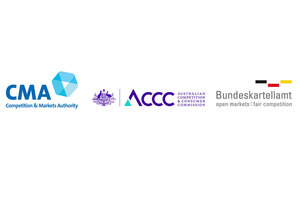UK, Australia and Germany issue statement on merger control
Three leading competition authorities come together to stress importance of merger enforcement for healthy economic recovery

The CMA has joined forces with counterparts in Australia and Germany to set out the need for robust merger enforcement to drive post-pandemic economic growth.
The Competition and Markets Authority (CMA), the Australian Competition and Consumer Commission (ACCC) and Germany’s Bundeskartellamt have signed up to the statement, which comes as countries build back following the Coronavirus (COVID-19) pandemic.
With it, all 3 authorities are being clear that competition between businesses will remain important for consumers as well as other businesses who want to best serve their customers and grow.
It is designed as well to provide clarity to businesses, advisers, courts and governments that the competition authorities will continue to provide a robust challenge to merging companies across all markets.
In dynamic markets like digital, this involves taking a critical look at the likelihood of future competition concerns occurring and acting as appropriate to stop problematic mergers. Linked to this, the authorities are also setting out their view that blocking such problematic mergers or requiring divestments is much more likely to preserve competition than behavioural solutions.
CMA CEO Andrea Coscelli commented:
As our countries emerge from the coronavirus pandemic, competition will have a crucial role to play in helping our economies grow. That’s why I am delighted to be standing with our counterparts in Australia and Germany on this timely statement.
The economic evidence consistently shows that competition is vital for innovation, productivity and sustainable long-term growth and jobs. I also hear directly from UK businesses who have found themselves in very difficult positions after problematic deals are cleared; some unable to survive because they can no longer compete. It’s important that we continue to thoroughly examine mergers on behalf of business and consumers – especially in dynamic markets like digital – and take strong action where needed.
ACCC Chair Rod Sims:
I am delighted to be releasing this joint statement with our UK and German counterpart authorities. We all recognise that competition is fundamental to the success of a market economy. Competition crucially depends on effective merger control.
Companies have a clear incentive to merge with or acquire their competitors to increase their market power and raise prices. This is why effective merger control is so important, and why some mergers must be blocked by competition authorities.
We know that once market power is gained from a merger, it is very difficult to restore competition with our other competition enforcement tools, making it crucial for us to use merger control more effectively.
The focus of competition agencies, courts and tribunals must be on the importance of protecting competition and preventing anti-competitive mergers, otherwise there is a risk that merger control instead skews towards merger clearance and so damages our economy.
Andreas Mundt, President of the Bundeskartellamt:
Effective merger control is the most powerful instrument we have to prevent too much market power falling into the hands of only a few companies. We see particularly strong market concentration in the digital economy. Further takeovers and mergers can cause tipping in the market or create ecosystems which are almost incontestable for competitors. Stringent merger control is therefore indispensable. Where possible, imminent competition problems can be solved by imposing conditions. In this case structural remedies are clearly preferable since they permanently safeguard the competitive framework. There are good reasons why under German merger control it is not possible to impose conditions that subject the behaviour of the undertakings involved to continued control.
Abuse proceedings are difficult, lengthy, involve many economic and legal issues when it comes to Big Tech, and are merely aimed at a company’s specific conduct. If we do not rigorously apply merger control and prohibit anti-competitive mergers, the post-merger road that we subsequently have to take is a very difficult one.
Notes to editors
-
Read the CMA’s Merger Assessment Guidelines for information on the CMA’s processes.
-
For media enquiries, contact 020 3738 6460 or email press@cma.gov.uk